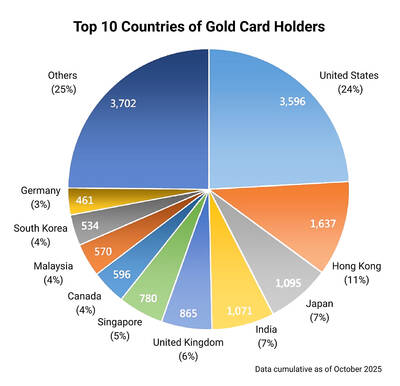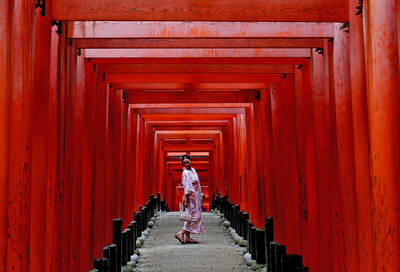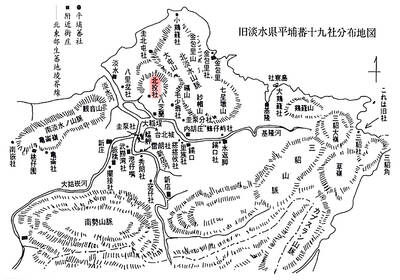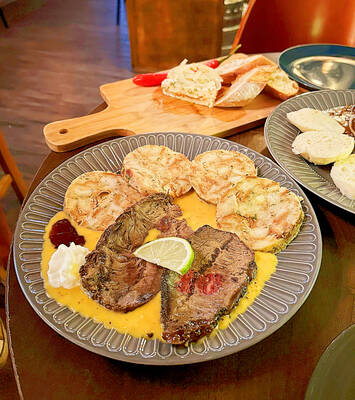The organizers of Peacefest, the annual anti-war music festival in Taoyuan County started by a group of expats, are shifting their attention to the environment.
Held in collaboration with local activists, Earthfest is a weekend of live music in the scenic forest area of Kunlun Herb Gardens in Taoyuan County, which starts next Friday. More than 40 bands and DJs, both expat and Taiwanese, will be performing, and proceeds will go to several of the country’s non-profit environmental groups.
Given the locale and people involved, the event will likely feel a lot like Peacefest, but the theme has a more practical bent. “Peacefest is more about ‘why,’ and Earthfest is the ‘how’ … how to actually do something positive for the environment,” says Sean Wratt, one of the organizers.
The festival aims to put green ideals into practice. All stage equipment and lighting for the music will be powered by bio-diesel fuel made from recycled cooking oil. Organizers are trying to arrange workshops on solar-powered cooking, organic farming and composting. The roving art fair and market Campo will sell environmentally friendly products at the event.
The organizers have also applied the concept of sustainability to financing the festival. Earthfest operates as a non-profit organization that pays its workers, whereas Peacefest relies solely on volunteers.
But Earthfest workers get paid only if the festival turns a profit; if the festival loses money, the workers have to fork out themselves. And to ensure that charities receive a robust share of the revenues, there is a limit on how much they can earn.
This system aims to create a “sense of financial responsibility” among workers while ensuring “their hearts are in the right place,” according to a document posted on Earthfest’s Web site.
The event is a good opportunity to bring like-minded people together, says Calvin Wen (溫炳原) of the Taiwan Friends of the Global Greens (全球綠人台灣之友), a Taipei-based environmental advocacy group that helped organize the festival.
Wen’s group will run a booth at Earthfest to publicize its work, which includes organizing local rallies for this year’s Global Day of Action on Dec. 6, scheduled to coincide with the UN’s annual meeting on climate change.
Other NGOs aim to raise public awareness of local issues including nuclear waste and the Fourth Nuclear Power Plant and the conservation of the Chinese White Dolphin along Taiwan’s west coast.
Bands appearing at Earthfest include a long list of crowd-pleasers and Peacefest regulars: Mister Green and Highway 9; Militant Hippi; and the Money Shot Horns.
Prominent Taiwanese acts include punk-garage rockers 88 Balaz (八十八顆芭樂籽), traditional Taiwanese hip-hop outfit Kou Chou Ching (拷秋勤), and nu-metal funk rockers Coach. On the electronic music front, S.U.N. Project and DJ Marco Menichelli will be visiting from Germany.
Both camping accommodations and onsite hotel rooms are available. Visit the Earthfest Web site for details.

Seven hundred job applications. One interview. Marco Mascaro arrived in Taiwan last year with a PhD in engineering physics and years of experience at a European research center. He thought his Gold Card would guarantee him a foothold in Taiwan’s job market. “It’s marketed as if Taiwan really needs you,” the 33-year-old Italian says. “The reality is that companies here don’t really need us.” The Employment Gold Card was designed to fix Taiwan’s labor shortage by offering foreign professionals a combined resident visa and open work permit valid for three years. But for many, like Mascaro, the welcome mat ends at the door. A

The Western media once again enthusiastically forwarded Beijing’s talking points on Japanese Prime Minister Sanae Takaichi’s comment two weeks ago that an attack by the People’s Republic of China (PRC) on Taiwan was an existential threat to Japan and would trigger Japanese military intervention in defense of Taiwan. The predictable reach for clickbait meant that a string of teachable moments was lost, “like tears in the rain.” Again. The Economist led the way, assigning the blame to the victim. “Takaichi Sanae was bound to rile China sooner rather than later,” the magazine asserted. It then explained: “Japan’s new prime minister is

NOV. 24 to NOV. 30 It wasn’t famine, disaster or war that drove the people of Soansai to flee their homeland, but a blanket-stealing demon. At least that’s how Poan Yu-pie (潘有秘), a resident of the Indigenous settlement of Kipatauw in what is today Taipei’s Beitou District (北投), told it to Japanese anthropologist Kanori Ino in 1897. Unable to sleep out of fear, the villagers built a raft large enough to fit everyone and set sail. They drifted for days before arriving at what is now Shenao Port (深奧) on Taiwan’s north coast,

Divadlo feels like your warm neighborhood slice of home — even if you’ve only ever spent a few days in Prague, like myself. A projector is screening retro animations by Czech director Karel Zeman, the shelves are lined with books and vinyl, and the owner will sit with you to share stories over a glass of pear brandy. The food is also fantastic, not just a new cultural experience but filled with nostalgia, recipes from home and laden with soul-warming carbs, perfect as the weather turns chilly. A Prague native, Kaio Picha has been in Taipei for 13 years and